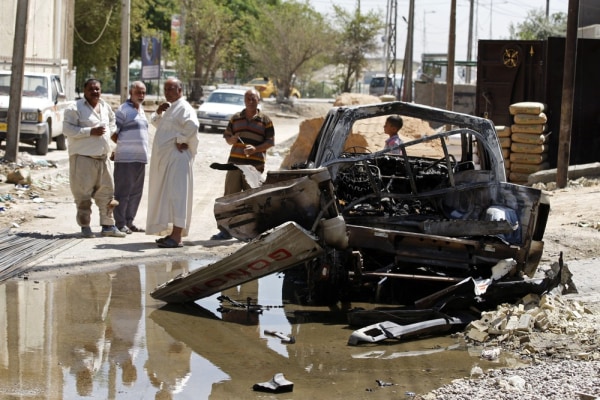Will the cities burn?
The nine judgments begin with "a great nation [The United States of America] with many kings [The Coalition of the Willing] (being) aroused from the remote parts of the earth. They seize their (weapons); they are cruel and have no mercy [Abu Ghraib tortures]... (They are) marshalled like a man for the battle against you, O (future) daughter of Babylon [Iraq].
"The king of Babylon [Saddam Hussein] has heard the report about them, and his hands hang limp; distress has gripped him, agony like a woman in childbirth. [Samira Shahbandar, Saddam's second wife, said that as the Americans surged into the centre of the capital, Hussein crumbled: "He came to me very depressed and sad. He took me to the next room and cried. He knew he had been betrayed." The Sunday Times Dec 15, 2003]
"Thus says the LORD:... 'I shall dispatch foreigners to Babylon that they may... devastate her land... Devote all her army to destruction. And they will fall down slain in the land of the Chaldeans, and pierced through in their streets.'"
The invasion will result in its capture, the second judgment: "Declare and proclaim among the nations...'Babylon has been captured'... 'I set a snare for you, and you were also caught, O Babylon, while you yourself were not aware; you have been found and also seized because you have engaged in conflict with the LORD.'"
Despite what Samira said about her husband -- "If I know my husband, he will not be captured," -- the culmination of this second judgment and the end to all resistance was in fact the capture of the ruler, Saddam Hussein himself, who was hiding in a rat hole in the desert. "In the last analysis, he seemed not terribly brave," quipped US Defense Secretary Donald Rumsfeld.
The third judgment was the execution of the Arrogant One: "I am against you, O arrogant one... For your day has come when I shall punish you. And the arrogant one will stumble and fall [through the trap door of the gallows] with no one to raise him up..." [Saddam's corpse was taunted by those in attendance.]
The hebrew conjunction "and" links the execution to the next judgment: "The arrogant one will... fall with no one to raise him up. And I shall set fire to his cities, and it will devour all his environs." The judgment of fire is repeated: "And her high gates [city centers] will be set on fire; so the peoples will toil for nothing, and the nations become exhausted (because of the) fire."
The exhaustion of the nations because of the fires leads to the fifth judgment: abandonment -- "Bring balm for her pain; perhaps she may be healed. 'We applied healing to Babylon, but she was not healed; forsake her and let us each go to his own country, for her judgment has reached to heaven and towers to the very skies.'"
Will the cities of Iraq burn? Is the ISIS militant revolution going to burst into literal flames? Will this be the fulfillment of the fourth judgment?
Is Iraq the Babylon of Jeremiah chapters 50 - 51?
Labels: Judgment 1 - Invasion, Judgment 2 - Capture, Judgment 3 - Punishment, Judgment 4 - Burning, Judgment 5 - Abandonment




